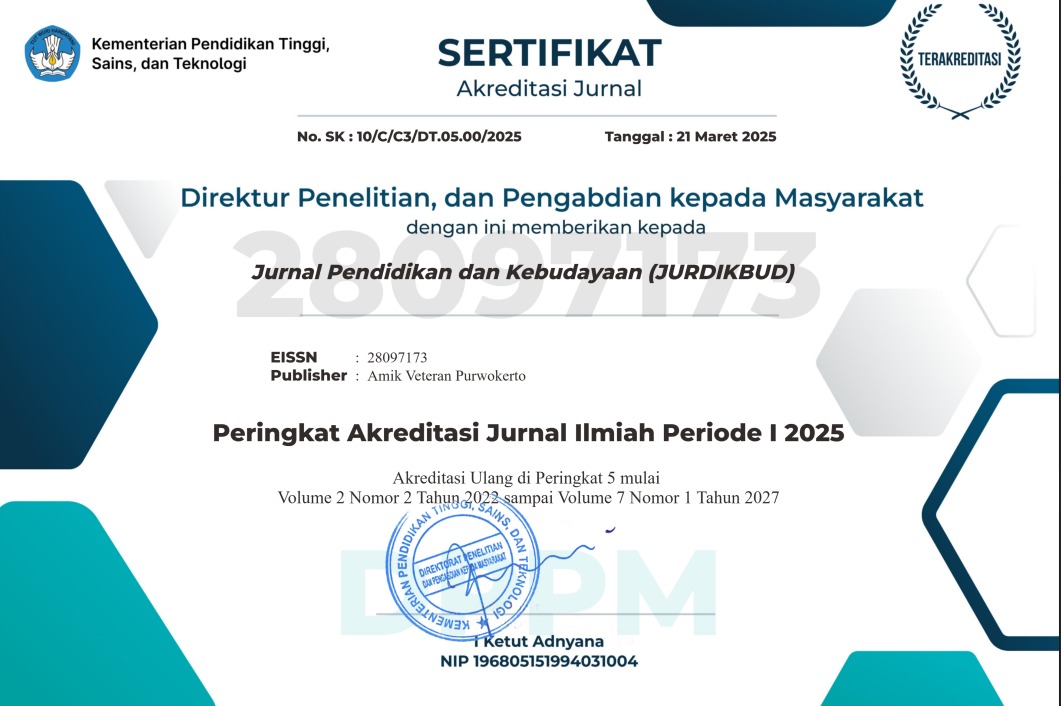Persepsi Mahasiswa UNIMED Tentang Pembentukan Undang-Undang Kilat, Studi Kasus: (Undang-Undang Kontroversial Di Universitas Negara Medan)
DOI:
https://doi.org/10.55606/jurdikbud.v5i2.6168Keywords:
Unimed Students, Legislation, ControversialAbstract
Fast-track legislation refers to a legislative process that proceeds rapidly, oftenwithout adequatepublic participation and is considered lacking in transparency.This study employs a descriptive qualitative method with data collection techniquesincluding observation, interviews, and documentation. The number of respondentsto be studied is approximately ten. The research focuses on one or more laws thatare considered controversial by the public, such as the Military Law (TNI Law), theJob Creation Law (Omnibus Law), and the Mineral and Coal Mining Law (MinerbaLaw). The aim of this study is to analyze the perceptions of Unimed students towardthe formation of fast-track legislation, particularly those that frequently sparkpublic controversy. This study aims to analyze the perceptions of Unimed studentsregarding the formation of fast-tracked legislation, particularly those that oftentrigger public controversy. The research is expected to provide an overview of theextent to which students understand, respond to, and critique the practice ofexpedited lawmaking, as well as highlight its impact on public trust in the legal drafting process in Indonesia. The findings indicate that the majority of UNIMEDstudents have a negative perception of fast-tracked legislation, as the process isconsidered rushed, lacks public participation, and does not follow a transparentdeliberative mechanism. The conclusion of this study is that the absence of publicinvolvement in the legislative process strengthens students' distrust in legislativeinstitutions, fosters a skeptical attitude, and even encourages their involvement incritical movements as a form of social control.
References
Abdussamad, Z. (2021). Metode Penelitian Kualitatif. CV. Syakir Media Press. Amin, F., Susmayanti, R., Fuqoha, Faried, S. F., Suwandoko, Zaelani, M. A.,
Agustiwi, A., Herlina, Permana, D. Y., Yudanto, D., Muhtar, M. H., Hadi, A. M., Widodo, I. S., & Rizaldi, M. (2023). ILMU PERUNDANG-UNDANGAN
(Iftitah (ed.)). PT Sada Kurnia Pustaka.
Asrori. (2020). Psikologi Pendidikan Pendekatan Multidisipliner. CV. Pena Persada.
Chalim, M. A., Faisal Farhan. (2015). Peranan Dan Kedudukan Tentara Nasional Indonesia (TNI) Di Dalam Rancangan Undang-Undang Keamanan 102 Nasional Di Tinjau Dari Perspektif Politik Hukum Di Indonesia. Jurnal Pembahuruan Hukum.
Dalimunthe, D. (2018). Proses Pembentukan Undang-Undang Menurut UU No. 12 Tahun 2011 Tentang Pembentukan Peraturan Perundang-Undangan. Jurnal Al-Maqasid, 4(2), 59–75.
Faqih, M. (2019). Proses Pembentukan Undang-Undang Dan Peraturan Pemerintah Pengganti Undang-Undang. Mimbar Yustitia, 3(2), 165–178. https://doi.org/10.52166/mimbar.v3i2.2307
Gazali. (2014). Pengantar Ilmu Perundang-Undangan. In Bahtiar (Ed.), Angewandte Chemie International Edition, 6(11), 951–952. Sanabil.
Gumilang, B. M., Oktariani, S., & Suswinda, T. (2022). Analisis Undang-Undang No.3 Tahun 2020 yang Berpotensi Merugikan Masyarakat dan Lingkungan Berdasarkan Prinsip Sustainable Development Goals. Jurnal Hukum Lex Generalis, 3(11), 871–891. https://doi.org/10.56370/jhlg.v3i11.336.
Hasananuddin Hasan. (2017). Hierarki Peraturan Perundang-Undangan Negara Republik Indonesia Sebagai Suatu Sistem. Madani Legal Review, 1(2), 120–
130. https://doi.org/10.31850/malrev.v1i2.32
Jayanti, F., & Arista, N. T. (2018). PERSEPSI MAHASISWA TERHADAP PELAYANAN PERPUSTAKAAN UNIVERSITAS TRUNOJOYO MADURA. Kompetensi, 12(2), 205–223.
Mahmud, R., Ngiu, Z., Yunus, R., Hamim, U., & Wantu, A. (2023). Pendidikan Kewarganegaraan Untuk Perguruan Tinggi. Penerbit Samudra Biru.
Nisa, A. H., Hasna, H., & Yarni, L. (2023). Persepsi. 2(4), 213–226.
Putriana, A., Kasoema, R. S., Gandasari, M. D., Retnowuni, A., Aminah, R. S., Wiyati, E. K., Kato, I., Akbar, M. F., Yani, A. L., & Sari, I. M. (2021). Psikologi Komunikasi. Yayasan Kita Menulis.
Qamar, N., & Rezah, F. S. (2020). Ilmu dan Teknik Pembentukan Peraturan Perundang-Undangan. In K. A. Muzakkir (Ed.), Sustainability (Switzerland). CV. Social Politic Genius. http://scioteca.caf.com/bitstream/handle/123456789/1091/RED2017-Eng-8ene.pdf?sequence=12&isAllowed=y%0Ahttp://dx.doi.org/10.1016/j.regsciurbeco.2008.06.005%0Ahttps://www.researchgate.net/publication/305320484_SISTEM_PEMBETUNGAN_TERPUSAT_STRATEGI_MELESTARI.
Rokilah. (2024). The Role of the Regulations in Indonesia State System. Jurnal Ilmu Hukum. 4(1). 29-38
Saputra, G. T., & Rafni, A. (2018). Persepsi Mahasiswa terhadap Pembelajaran Mata Kuliah Umum Pendidikan Kewarganegaraan sebagai Sarana Pendidikan Politik. Journal of Civic Education, 1(4), 464–469. https://doi.org/10.24036/jce.v1i4.345
Sukadi, M., & Nuriskandar, L. H. (2024). Pengaruh Partisipasi Publik Dalam Pembentukan Undang-Undang di Era Digital: Studi Kasus Pada UU Cipta Kerja. Jurnal Perbandingan Mazhab Dan Hukum, 3(1), 31–55. https://ejournal.stisdarussalam.ac.id/index.php/jurdar
Sulistyawati. (2023). Penelitian Kualitatif : Metode Penelitian Kualitatif. In Jurnal EQUILIBRIUM (Vol. 5, Issue January). http://belajarpsikologi.com/metode- penelitian-kualitatif/
Syamsudin, A. (2021). Proses & Teknik dan Penyusunan Undang-Undang (Vol. 1, Issue 3).
Wijayanti, W. (2016). Eksistensi Undang-Undang Sebagai Produk Hukum dalam Pemenuhan Keadilan Bagi Rakyat (Analisis Putusan Mahkamah Konstitusi Nomor 50/PUU-X/2012). Jurnal Konstitusi, 10(1), 179. https://doi.org/10.31078/jk10.
Yosarie, I., Reffeisen, T., Hasibuan, F. K., Yunus, A., Adiputra, A. M., Ahmad, H., & Rezaldy, A. M. (2023). Mengawal Reformasi Tentara Nasional Indonesia Melalui Penolakan Usulan Perubahan dalam Revisi Undang-Undang Nomor 34 Tahun 2004 tentang Tentara Nasional Indonesia (G. Mabruri & A. Araf (eds.)). Imparsial.
Downloads
Published
How to Cite
Issue
Section
License
Copyright (c) 2025 Jurnal Pendidikan dan Kebudayaan (JURDIKBUD)

This work is licensed under a Creative Commons Attribution-ShareAlike 4.0 International License.









